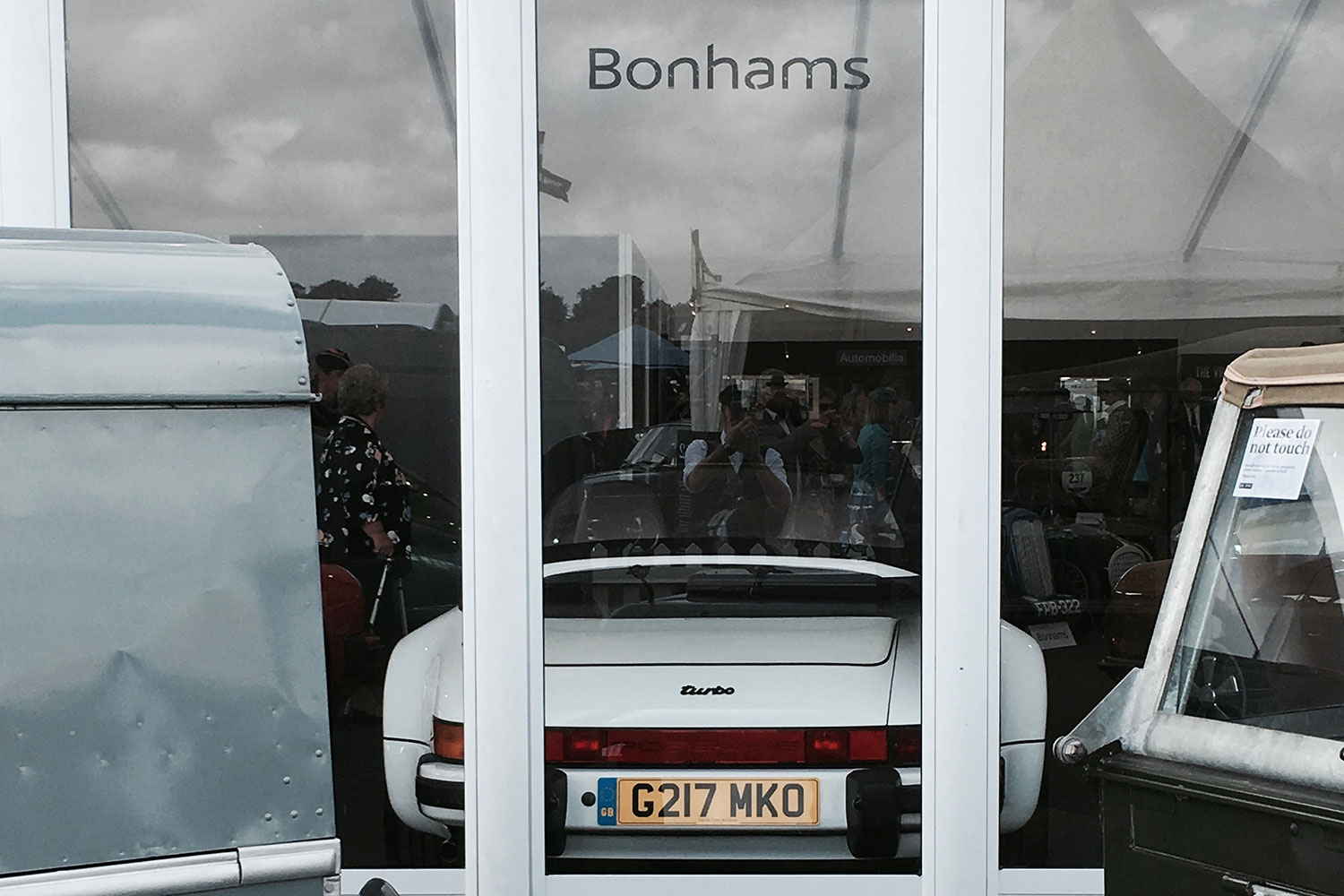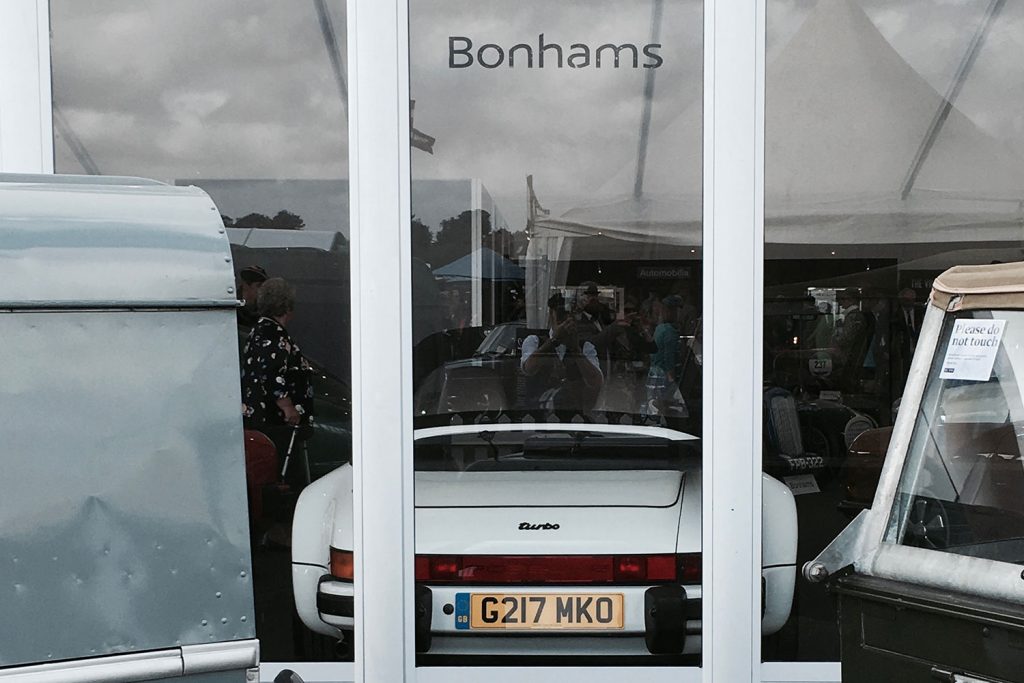Buying a classic car at auction can be a fantastic experience, but it can also be a hugely daunting prospect for anyone new to the process.
There are few things more gut wrenching than buyers remorse – especially when that decision has cost several thousand pounds…
This post is for anyone who wants to buy from a classic car auction for the first time, without the subsequent feeling that they’ve just spent the grand-kids inheritance on a bit of a dog.
My Top 10 Considerations for Buying a Classic Car at Auction
- Decide which car you’re interested – Bit of a no brainer perhaps
- Get to a few auctions – Watch and listen
- Set your budget – And then deduct the buyers commission etc. Learn about the auction fees
- Do your research – Make, model, common problems, buyers guides, recent values etc.
- Look for history & provenance –
- Inspect the car first hand – Or get an expert to advise
- Don’t rely on the Auctioneers evaluation – Their idea of a ‘bargain’ may not be yours
- Go to the previews – Talk to the auction staff, listen to conversations
- Keep calm – Don’t get into a ego war
- Walk Away – Be prepared to walk away
So, there’s the list, let’s go through some of these points in a bit more detail. Please do feel free to comment at the end with any nuggets from your own experiences.
Decide Which Car Your Interested In
Car buying 101 stuff this maybe but how many times have you been cajouled into buying something other than the thing you actually wanted. When I originally decided that I was in the market for my first porsche 911 my first thought was a secondhand 1990’s 993.
What I wanted and what I could afford turned out to be a way apart…
Turned out I couldn’t afford a good ’98 wide-bodied, VarioRam engined, Carrera S (I know, I’m a tart). What I wanted and what I could afford turned out to be a way apart – thankfully this played to my advantage several years down the road.
The point is, 911 ownership is what floated my boat. I wanted a Porsche 911, not a ferrari or a Jag or a mini or an MG or anything else for that matter. Thankfully in 2006, there were plenty of older, less expensive 911 models to choose from.
Get to a Few Auctions
See it, feel it, get familiar.
Like most things in life, being in unfamiliar territory can be daunting, and this is especially true if you’re also required to perform in some way in front of a crowd.
Let’s be honest, an auctioneers dream is a crowd full of ego’s. Your job is to refrain from being that guy.
Putting yourself in an environment that makes you uncomfortable is fine but only if you’re prepared. A boxer doesn’t just get in the ring – he trains. Public speakers don’t just get up and speak – they practise. Comedians don’t just get up and tell jokes – they work to perfect delivery.
What’s that military cliché ‘Failing to plan is planning to fail’.
Get to a few auctions. Familiarise yourself with a few different types of classic car auctions – there a list of UK classic car auctions here – mingle with the experts. Read up on what goes on. Listen to the auctioneers, speak to them, watch the bidders, make notes, stay ’til the end.
Set Your Budget
There’s two things to consider here.
First up, you need to understand the difference between all the terminology. If you’re not sure of the difference between the hammer price and the buyers premium then find out.
Here’s a good classic car auction jargon buster list by the BCA.
Now, I’m not your mother, I don’t care how much you spend. However, practising self control is a must when sticking to a budget and it’s usually easier said than done.
There are plenty of bidding war tales erupting between two or three keen buyers.
Auction crowds (and Auctioneers) love nothing better than the clash of two mighty ego’s over a particular vehicle – this from the CCA website:
“Headlining the results was a rare and low mileage 1985 BMW M635 CSI manual which sold for an amazing £100,100 including buyer’s premium, more than double its upper estimate and a believed UK auction record. The highly original, manual car had covered only 15,300 miles in the hands of just two owners and was subject to a long bidding war between buyers in the room and over the phone.”
Practising self control is a must when sticking to a budget and it’s usually easier said than done.
And this battle at Silverstone Auctions Race Retro Bidding war this year.
“Jaguar collectors were clearly impressed by the fully restored, matching numbers 1960 Jaguar XK150 3.8 SE Drophead Coupé. A long bidding war led to the car selling for £132,750, more than double its lower estimate. Another bidding war led to the stunning 1953 Alfa Romeo 1900 Barchetta Modificato selling to a buyer in the room for £94,500, nearly £30,000 over its lower estimate.”
Big money examples granted but I can guarantee it happens throughout the auction world irrespective of the final fee.
Do Your Research
Researching your choice of classic car is one of the fun parts of the process. Typically far less stressful than actually dealing with people. Whether you start with classic cars for sale websites online or in the classifieds within printed magazines there are a huge number of resources at your disposal.
Make sure whatever you do, you do a lot of it. Make lists, right notes, create spreadsheets, infographics, pinterest boards, photo albums whatever. But do it until you are sure you know the model you want inside out and back to front.
Unless your heart is set on some obscure eastern european three-wheeler prototype there really shouldn’t be any excuse for not knowing the differeneces between models, their values, good independent dealers and the common problems to look out for.
Remember; try not get too hung up on one persons opinion until you’ve spoken to a number of experts
Classic Car owners clubs typically produce handy buying guides, plus they usually have experts on hand for advice and guidance too. And there are also classic car forums – but remember try not get too hung up on one persons opinion until you’ve spoken to a number of experts.
Look For History & Provenance
I was always told that when buying a classic car over a certain age, and one you wish to actually drive, you should be less worried about the number of miles on the clock and more concerned with the number of receipts and who they’re from.
Value will be reflected in a number of ways history dictates the head, provenance may sway the heart. I’ve always understood the history to be the key to the mechanics, the provenance is the key to the added value. An ex-Steve McQueen car will carry a whacking great big premium over an ex-Tory ministers wife Mini but both are sure to add £’s to the value.
I’ve always understood the history to be the key to the mechanics, the provenance is the key to the added value
Look for regular maintenance receipts, services receipts, MOTS and past owner details. Obviously the more of this you have at your disposal the more you will be able to make an informed decision as to the cars background and work carried out recently. All valueable intel for when you come to put agree a price on the car that you feel is a fair reflection of value to you.
Inspect The Car First Hand (Or Get An Expert To)
Whether you’re a just tyre-kicker like me or a proper real-life mechanic, when buying a Classic Car at Auction there’s no substitute for seeing the car up close. Most Auctions have preview days in the run up to the main event.
Have your checklist with you and don’t be afraid to ask questions of the main description. Consider taking an expert with you or have an expert go to the preview and inspect the car on your behalf.
Consider taking an expert with you or have an expert go to the preview and inspect the car on your behalf
From your list of common issues and problems you can go around the car and inspect those areas, common rust spots, check electrics, fire the car up, check for blue smoke and leaks on the floor.
Which ever way you inspect the vehicle don’t buy the car blind unless you are 100% sure what your getting into.
Don’t Rely On The Auctioneers Description
As above, when buying any car (let alone when buying a Classic Car at Auction) the dealers or auctioneers view may differ from your own.
The auctioneers view of the car is likely to differ from your own.
There is a good post by Classic Car Sports and Finance chaps that covers this and some other pertinent advice when buying from classic car auctions. It’s well worth a read.
Keep Calm & Walk Away
Some of the best advice I’ve ever heard when buying a Classic Car at Auction is to keep calm and be prepared to walk away.
Read again; Keep calm and be prepared to walk away
Of course, this is the single easiest piece of advice to give and yet easily the hardest to take on board in the heat of the moment.
The problem with buying a classic car at aution or anywhere else for that matter, is it’s rarely a head decision.
Buying decicsions for classic cars (and logic for that matter, for enthusisast at any rate) are typically driven by emotion.
There is always some form of emotional connection between the car and the buyer and this can lead to irrational behaviour unless you are breathing and understand WTF is going on as you battle some dude on the phone for a £10k classic car that your Dad had when you were young and you’re at £11,500 already and you’ve forgotten about the buyers premium to add to that…
Keep calm and be prepared to walk away.
Quick Summary
Remember: when buying a classic car at auction always buy for the love and not for making the money – that way you’ll not be disappointed (Probably, possibly. Dont quote me on that).
Video courtesy of CCA
This post is created to help beginners with buying a Classic Car at Auction and to help research and then action that research with a little more confidence.
If we’ve left out some key advice or guidance please share it with everyone so that we can all learn and have a better experience at the next classic car auction.


1 Comment
This is an excellent resource for anyone who wants to learn more about the subject.
Leave A Comment